The AMD Ryzen Threadripper 1950X and 1920X Review: CPUs on Steroids
by Ian Cutress on August 10, 2017 9:00 AM ESTCPU Legacy Tests
Our legacy tests represent benchmarks that were once at the height of their time. Some of these are industry standard synthetics, and we have data going back over 10 years. All of the data here has been rerun on Windows 10, and we plan to go back several generations of components to see how performance has evolved.
All of our benchmark results can also be found in our benchmark engine, Bench.
3D Particle Movement v1
3DPM is a self-penned benchmark, taking basic 3D movement algorithms used in Brownian Motion simulations and testing them for speed. High floating point performance, MHz and IPC wins in the single thread version, whereas the multithread version has to handle the threads and loves more cores. This is the original version, written in the style of a typical non-computer science student coding up an algorithm for their theoretical problem, and comes without any non-obvious optimizations not already performed by the compiler, such as false sharing.
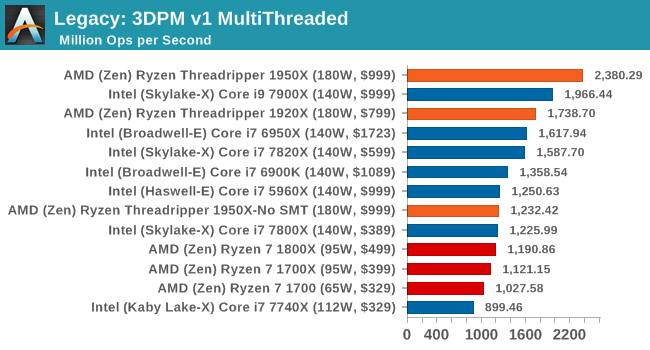
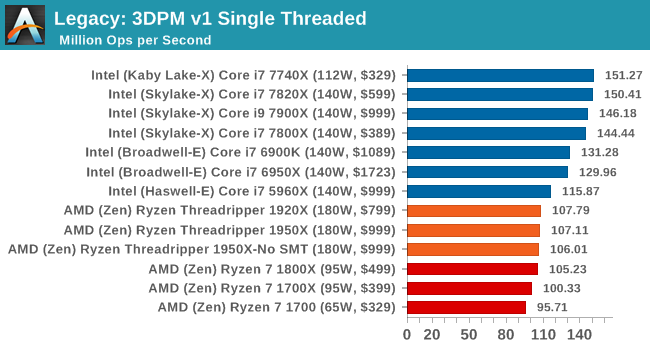
CineBench 11.5 and 10
Cinebench is a widely known benchmarking tool for measuring performance relative to MAXON's animation software Cinema 4D. Cinebench has been optimized over a decade and focuses on purely CPU horsepower, meaning if there is a discrepancy in pure throughput characteristics, Cinebench is likely to show that discrepancy. Arguably other software doesn't make use of all the tools available, so the real world relevance might purely be academic, but given our large database of data for Cinebench it seems difficult to ignore a small five minute test. We run the modern version 15 in this test, as well as the older 11.5 and 10 due to our back data.
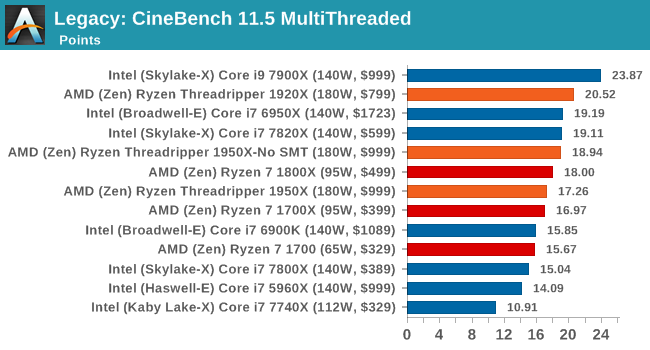
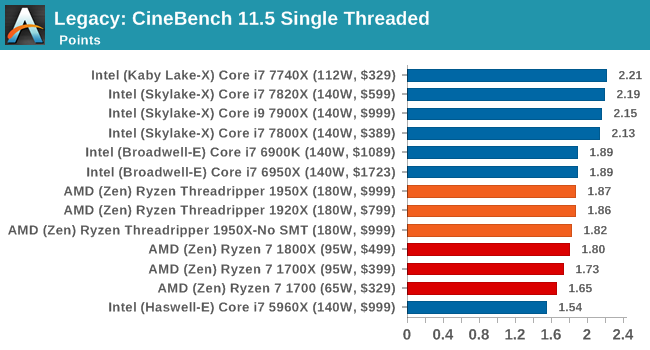
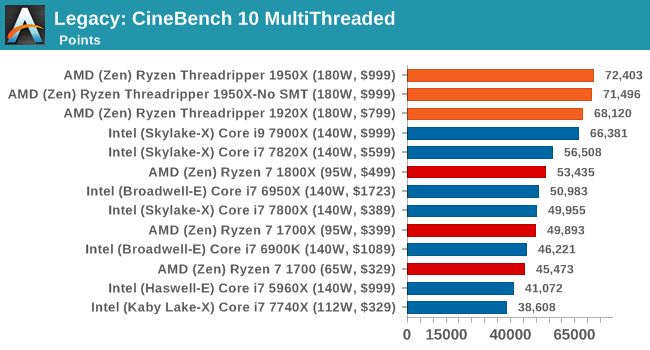
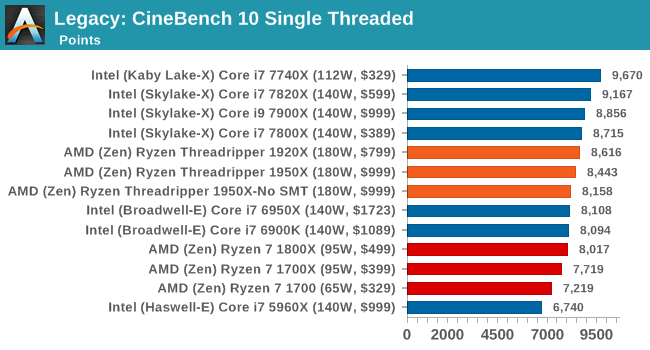
x264 HD 3.0
Similarly, the x264 HD 3.0 package we use here is also kept for historic regressional data. The latest version is 5.0.1, and encodes a 1080p video clip into a high-quality x264 file. Version 3.0 only performs the same test on a 720p file, and in most circumstances the software performance hits its limit on high-end processors, but still works well for mainstream and low-end. Also, this version only takes a few minutes, whereas the latest can take over 90 minutes to run.
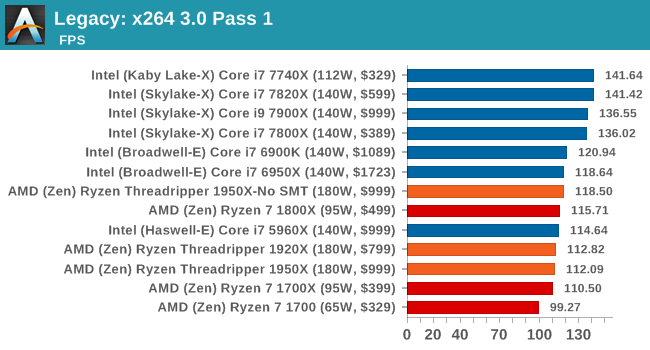
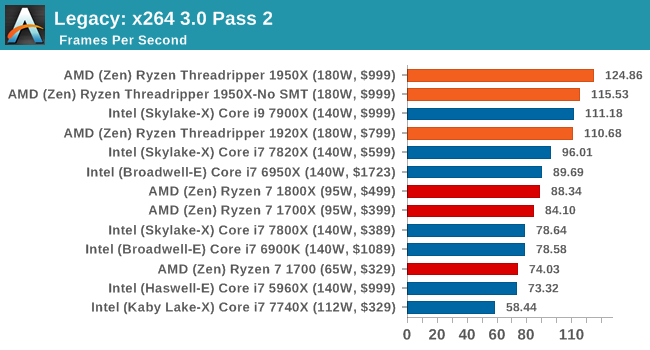
The 1950X: the first CPU to score higher on the 2nd pass of this test than it does on the first pass.










347 Comments
View All Comments
ddriver - Thursday, August 10, 2017 - link
Yeah if all you do all day is compile chromium with visual studio... Take that result with a big spoon of salt.Samus - Thursday, August 10, 2017 - link
This thing can also decompress my HD pr0n RARs in record time!carewolf - Thursday, August 10, 2017 - link
The jokes is on you. More cores and more memory bandwidth is always faster for compiling. Anandtech must have butched the benchmark here. Other sites show ThreadRipper whipping i9 ass as expected.bongey - Thursday, August 10, 2017 - link
They did without a doubt screw up the compile test. The 6950x is a 10 core /20 thread intel cpu, but somehow the 7900x has 20% improvement, when no other test even comes close to that much of an improvement. The 7900x is basically just bump in clock speed for a 6950x.Ian Cutress - Thursday, August 10, 2017 - link
'The 7900X is basically just bump in clock speed for a 6950X'L2 cache up to 1MB, L3 cache is a victim cache, mesh interconnect rather than rings.
mlambert890 - Saturday, August 12, 2017 - link
It's basically as far from 'just a bump in clock speed' as any follow up release short of a full architecture revamp, but yeah ok.rtho782 - Thursday, August 10, 2017 - link
The whole game mode/creator mode, UMA/NUMA, etc seems a mess. Games not working with more than 20 threads is a joke although not AMDs fault....mapesdhs - Thursday, August 10, 2017 - link
Why is it a mess if peope choose to buy into this level of tech? It's bring formerly Enterprise-level tech to the masses, the very nature of how this stuff works makes it clear there are tradeoffs in design. AMD is forced to start off by dealing with a sw market that for years has focused on the prevalence of moderately low core count Intel CPUs with strong(er) IPC. Offering a simple hw choice to tailor the performance slant is a nice idea. I mean, what's your problem here? Do you not understand UMA vs. NUMA? If not, probably shouldn't be buying this level of tech. :DprisonerX - Thursday, August 10, 2017 - link
That will change. Why invest masses of expensive brainpower in aggressively multithreading your game or app when no-one has the hardware to use it? No they do.Hurr Durr - Friday, August 11, 2017 - link
Only in lala-land will HEDT processors occupy any meaningful part of the gaming market. We`re bound by consoles, and that is here to stay for years.